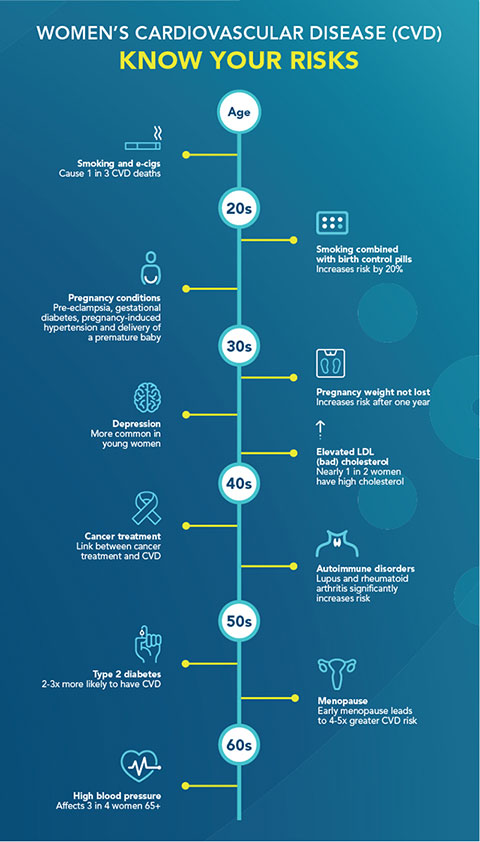PREVENT
Women's heart health: Know your risks

Courtney Baechler, MD, MSCE
- Heart disease is the leading cause of death for women in the United States.
- About 1 in 16 women age 20 and older (6.2%) have coronary heart disease.
- Heart disease warning signs aren't always the same for men and women.
Heart disease is the leading cause of death for women in the United States, responsible for about one in five deaths. Fortunately, most heart conditions are preventable and can be treated when detected early. That’s why it’s important to talk with your primary care provider or cardiologist about your heart health, especially if you have a family history or certain pre-existing conditions.
Are women more at risk?
You’ve likely heard high blood pressure, cholesterol and smoking are common risk factors for heart disease. But you may be surprised to learn why women are more at risk for heart disease than men.
Risk factors for women include:
- Small vessel disease. The condition damages the small arteries in the heart. Small vessel disease is more common among women and can be difficult to detect.
- Inactivity. A lack of movement is one of the most dangerous risk factors for heart disease. Some studies have indicated women are less active than men.
- Diabetes. Diabetic women are more likely to develop heart disease than diabetic men. Heart disease is a common diabetes complication.
- Smoking and vaping. Smoking puts women at more risk of heart disease than men. Nicotine, a highly addictive stimulant drug, pumps up your blood pressure, narrows your arteries and increases your risk of having a heart attack.
- Stress and depression. Women are nearly twice as likely to be diagnosed with depression. Stress and depression typically put more strain on women’s hearts than men’s. Depression can make it challenging to maintain an active lifestyle.
- Pregnancy conditions. Pregnancy complications such as high blood pressure (preeclampsia) and elevated blood sugar (gestational diabetes) increase your chances of developing heart disease.
- Menopause. Women with menopause may be more vulnerable to cardiovascular disease because of hormonal changes that can elevate blood pressure and cholesterol levels.
- Inflammatory diseases. Rheumatoid arthritis and lupus are known to increase the risk of heart disease. Inflammation can create blood clots and cause a heart attack.
Are certain age groups more at risk?
Heart disease doesn’t only affect older women, and people of all ages should monitor symptoms. Knowing the common symptoms is critical as mortality rates among women ages 35 to 54 continues to rise. Cardiovascular disease risk factors by age:

Typical heart disease symptoms for women
Heart disease may look different for men and women, but some symptoms can overlap. Women can reduce their risk of heart disease by identifying their unique symptoms.
Women are more likely to have symptoms, such as:
- shortness of breath
- neck, jaw, throat, abdomen or back pain
- sweating
- dizziness
- nausea or vomiting
- unusual fatigue
How to reduce your risk of heart disease
Adopting healthier habits can reduce your risk of heart disease. Some of the best ways to beat heart issues include:
- Quit smoking and vaping. Quitting tobacco is easier said than done. Fortunately, there are free resources available to help you succeed.
- Stay active. The American Heart Association recommends 150 minutes of physical activity per week. Whether you’re at home or work, there are plenty of activities to help you get moving.
- Eat healthy. Your provider can help create a heart-healthy diet and help you stay on track.
- Tame your stress. Excessive stress can cause high blood pressure and lead to heart disease. When stress takes over, exercise regularly, try mindfulness activities and avoid unhealthy habits such as smoking and drinking to cope with stress.
- Maintain a healthy weight. If you’re overweight, you could be at higher risk of high blood pressure and heart disease because your body works harder to circulate blood.
Prioritize your health
Women often face more pressure because they play multiple roles as mothers, caregivers, spouses and coworkers. No matter how busy life gets, put your health first. Schedule an appointment with your primary care provider to learn how to manage your heart health.
When to talk with a provider
Talk to your primary care provider if you experience any symptoms or have a family history of heart disease. They may refer you to a preventive cardiologist for a heart disease risk assessment. Talk with your provider before taking heart disease prevention medications.
MORE ARTICLES LIKE THIS
Women's heart health: Know your risks
Posted February 4, 2021
Heart disease is the leading cause of death for women in the United States, responsible for approximately one in five deaths. Fortunately, most heart conditions are preventable and can be treated when detected early. Learn why women are more at risk for heart disease than men.
Continue reading this article






